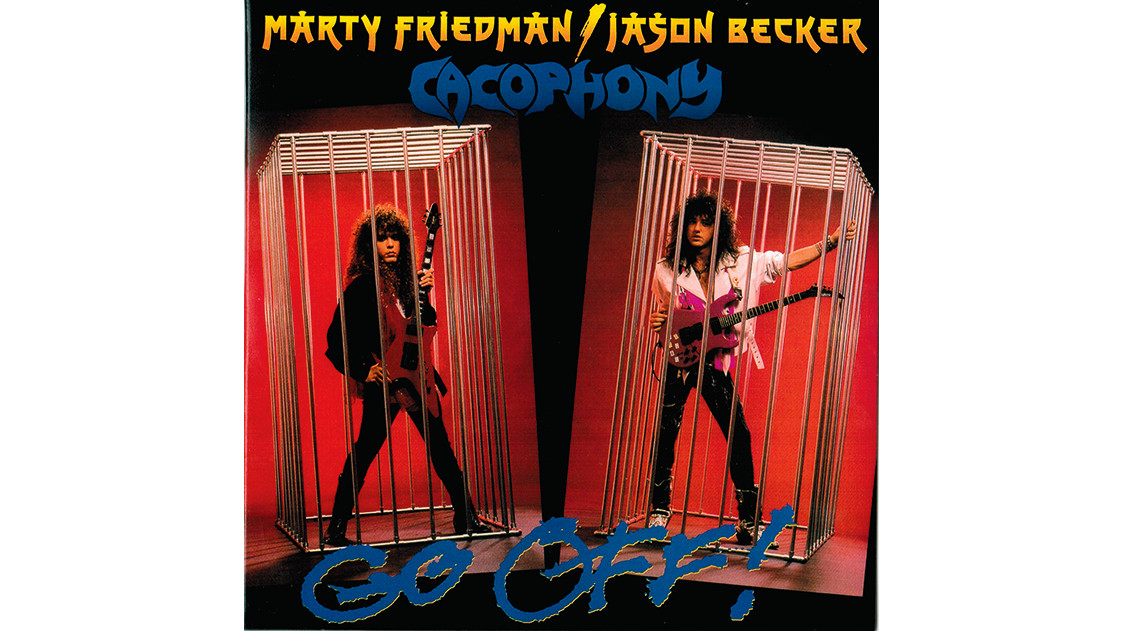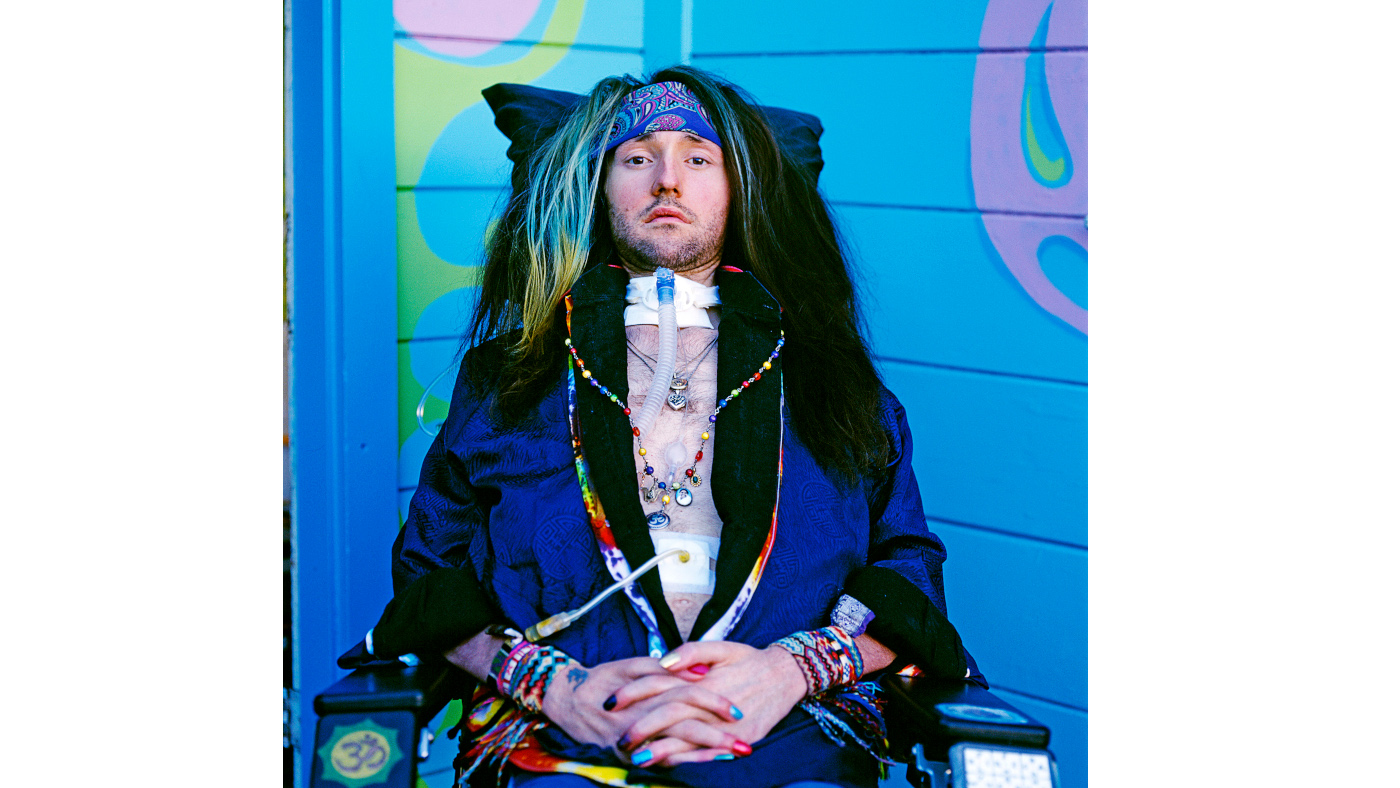Jason Becker and Marty Friedman: “Music comes out of silence... and I have a lot of silent time, without a pesky guitar interrupting my thoughts!”
The duo open up on their remarkable journey as guitarists...

After signing with Shrapnel Records at the age of 16, forming Cacophony with Marty Friedman, and later releasing his Perpetual Burn solo debut to mass critical acclaim, Jason Becker replaced Steve Vai in The David Lee Roth Band only to learn his career would be tragically cut short by Amyotrophic Lateral Sclerosis - and, most likely, so would his life.
The doctors gave the 20 year old another three to five years, but with support from his friends, family and modern technology - using only his eyes to communicate having lost the use of his limbs and voice - he’s still releasing cutting-edge music three decades on...
“I got my first guitar for Christmas when I was five years old,” begins Becker, corresponding with us via email. “My dad and my uncle played, so it was logical I would, too. My parents thought art was important and a lot of my childhood was spent doing some form of it or another. I didn’t get serious about playing until I was around eight and learned some Dylan chords. That took me into the world of playing music and I was hooked... Andrés Segovia was big for me. Then came Eric Clapton and Robbie Robertson. I wanted to master everything and learn it all because it was so much fun. Some of the best advice I got along the way was don’t be afraid to be passionate and don’t forget how to have fun.”
As it turned out, Jason’s father, Gary - who himself had taken lessons from one of Segovia’s students - would be responsible for setting the young musician on a more classical path. The first piece he encouraged his son to learn was the song A Soalin’ by American folk heroes Peter, Paul And Mary.
“It’s pretty simple, but has two distinct parts - one bass part and one high part,” recalls Jason, of those first steps into fingerstyle. “You can play them separately and then together. It gets your mind thinking about how to play different parts at the same time.”

Passion and warfare
Having impressed Shrapnel Records founder Mike Varney with his demo, the young prodigy was encouraged to meet new signing Marty Friedman and see what they could come up with together. The introduction would mark the beginning of Cacophony, but, more importantly, a lifetime of close friendship.
“It first started as me being the student, in a way,” says Becker. “Marty had a game where we would take turns playing chords and solos, but the one playing chords wouldn’t tell the other what we were going to play. We would try to surprise each other, and the soloist had to try and follow.”
Want all the hottest music and gear news, reviews, deals, features and more, direct to your inbox? Sign up here.
I’d show him unorthodox stuff I ripped off Stravinsky and the guy would mirror it right back to me, more efficiently and even nicer than I played it
Of their Speed Metal Symphony debut, Becker remains remarkably humble, noting these early recordings were made during his own stylistic development. Its successor, however, heeded a more level playing field between the two virtuoso musicians.
“I had some cool ideas, but I think Marty shined way more on the debut,” he notes. “Go Off! was more even, I brought something new and fresh - that’s why I used one of my solos from that album’s title track in Once Upon A Melody on Triumphant Hearts.”
For Friedman, the experience proved to be unexpectedly enlightening, fuelled by friendly competition from perhaps the only person he’d ever met that could keep up and, at times, even leave him in the distance.
“When Mike called me up saying I had to meet this kid called Jason Becker, I thought to myself, ‘Why?!’” he laughs, speaking to us from his home in Tokyo. “I was busy making my Shrapnel debut, the last thing I wanted to do was meet some new guy! But I didn’t want to put a monkey in my project so Jason came up to my San Francisco apartment. I instantly fell in love with the guy. He didn’t have much band experience, zero actually, but his dexterity and pitching was beyond anything else. I’d never met anyone that unaffected. He could turn techniques into something useful. I’d show him unorthodox stuff I ripped off Stravinsky and the guy would mirror it right back to me, more efficiently and even nicer than I played it. He forced me to up my game a lot and we both came out winning, so I decided to sacrifice my solo album and add as much of Jason’s flavour to make an album together as Cacophony.”

Flying in a blue dream
It was during these years that the pair became known for their ability to stun any audience in front of them - Becker hammering through mind- twisting legato runs at warp speeds while casually spinning a yo-yo with his right hand. The biggest challenge, he says, was not so much co-ordination, but rather controlling his instrument enough to ensure the five strings not being played weren’t ringing out.
“Jimi Hendrix was the master of live stuff,” continues Becker. “He was my inspiration to do the yo-yo, everything he did on stage was awesome. And I remember when I was 15, I played at a boy scout event, and threw my guitar up in the air after a solo, à la Yngwie, and it got stuck in some wires above me which weren’t visible, so it looked like magic. I raised my arms, like, ‘Ta-da!’”
A bitter blow
After two Cacophony albums, it felt like the right time to take their mercurial talents to bigger stages. With Friedman tapped up by Megadeth and Becker replacing one of his biggest heroes in David Lee Roth’s band, their futures looked as assured as any pair of 20-somethings could have hoped for. Tragically, life had other plans...
It was so unfair, I felt so bad. Why was one of us unable to do what he were destined to
“There was a really poignant moment for both of us,” remembers Friedman. “I remember we went to some family restaurant in LA and Jason told me there was something up with his leg and he was trying to keep it from the other members. It was something in the muscle, but he didn’t know [exactly what]. I had a serious problem with my right arm, too; doctors were telling me crazy shit like I had to stop guitar or I’d lose my arm. We were so down.”
From there, one of them would heal as the other’s condition deteriorated - robbed in his prime of what was rightfully his.
“It was so unfair, I felt so bad,” continues Friedman. “Why was one of us unable to do what he were destined to do? Why him? It’s a fucked up thing to see one of your closest friends go through. He deserved his gig as much as I did - or more. That was a very bittersweet time for me.”
“It isn’t easy being told you are going to die,” reflects Becker. “I am sure my survival is a combination of everything. I suppose it starts with my strength, or more accurately my stubbornness, and my belief in the impossible. I sort of feel like everything good stems from love. I wish everyone felt loved, like they made a difference, but it’s not as easy as that. I have had dark, death thoughts. No-one can always be positive if they are truly honest with themselves. Life sometimes sucks.”

The show must go on
Jason Becker now composes music by flicking his eyes and blinking over an alphabet board his father invented, painstakingly spelling out each word or note one at a time. With eye-reading software not quite accurate enough yet for his needs, he composes by “instructing caregivers with a simple communication system using the same technology a lot of people use - Logic Pro with some good samples on a Mac computer”.
For the orchestral scores, Skype proved to be a “very cool” way of watching conductor Shota Nakama and his musicians recording in Bulgaria, allowing Becker able to oversee things from the family home in California. Understandably, there are natural limitations composing without an instrument in his hands - but with them also comes the freedom of creating purely through the mind’s eye, conceiving ideas that can stretch beyond human physics.
“I guess technology did let me write things that are impossible to play,” ponders Becker. “This is something that Uli Jon Roth has also talked to me about. He wondered if my disease brings about certain ways of thinking and composing that might not have happened otherwise. I think I did that with the fast violin section in the song Triumphant Heart - luckily [Italian guitarist] Daniele Gottardo found Glauco Bertagnin who could actually play it though it wasn’t easy. I think music comes out of silence... and I have a lot of silent time, without a pesky guitar interrupting my thoughts [laughs]! ”
It’s hard not to wonder if things had turned out differently, where Becker might have ended up.
“I think I might have played with Steve Perry for a while,” he admits. “Other people I would have liked to play with are Bob Dylan, Paul Simon, Paul McCartney, Peter Gabriel, Willie Nelson, Shania Twain, Sarah McLachlan and... Britney Spears [laughs]!”

Alive in the ultra world
Marty brought things to my new album no-one else could have - the feel and emotion of our history together
What makes this year’s comeback even more groundbreaking is the wide breadth of talent lending its hands to help realise Jason’s vision. From blues giant Joe Bonamassa to fusion maestros Guthrie Govan and Richie Kotzen, to fellow 80s trailblazers Steve Vai and Joe Satriani, it could very well account for one of the greatest musical events in guitar history.
“Marty brought things to my new album no-one else could have - the feel and emotion of our history together,” says Becker. “He stepped up in a way that could take me back to the day, but also be a part of who we both are here and now. I love Guthrie. And Richie, too - him and I had so much fun recording his first album [in 1989]. We were so young!
“I did ask Yngwie and Brian Setzer, but since I don’t know them personally, I don’t think they received my email. I also would have loved to have had Jeff Beck, Eddie Van Halen, Seal, John Mayer, Stevie Wonder, Bonnie Raitt on the album... the list goes on!”
“Everyone’s playing is so upper level,” enthuses Friedman. “It’s not like there’s just one guy who is such a big star though doesn’t quite play at the level of the everyone else... there’s nothing like that. Jason gave me the most delicious part of the opening song, the first second you hear an electric guitar coming in on a key modulation. That’s the money shot right there! It was really his melody. I just made sure I played it in a way he was happy with...
“The task of editing these songs into cohesive music people can digest, rather than a shred battle, is not something I’m envious of. That’s an intense project I can’t even imagine... and I have a lot of guests on my records. Imagine Jason going through all of these brilliant guys trying to tell his own story with all that information; he did such a fantastic job. Drop the needle anywhere and it drips Jason, no matter who played or worked on the track. In the world of guitar, I don’t think there will ever be anything else like it.”
Amit has been writing for titles like Total Guitar, MusicRadar and Guitar World for over a decade and counts Richie Kotzen, Guthrie Govan and Jeff Beck among his primary influences. He's interviewed everyone from Ozzy Osbourne and Lemmy to Slash and Jimmy Page, and once even traded solos with a member of Slayer on a track released internationally. As a session guitarist, he's played alongside members of Judas Priest and Uriah Heep in London ensemble Metalworks, as well as handling lead guitars for legends like Glen Matlock (Sex Pistols, The Faces) and Stu Hamm (Steve Vai, Joe Satriani, G3).


